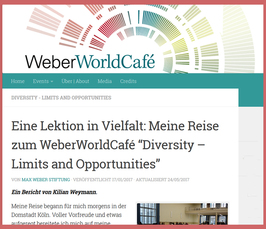"WeberWorldCafé “Diversity – Limits and Opportunities"
Workshops, conferences 2016
- Datum: 24.11.2016
- Uhrzeit: 15:00 - 18:00
- Ort: "Alte Mensa", Wilhelmsplatz 3, Göttingen

For more details please contact esser(at)mmg.mpg.de.
In recent years the concept of “diversity” has almost become a civic virtue as society continued to become more diverse due to, among other factors, increased mobility, less strict gender roles, improved living conditions and individualization processes. From NGOs to government agencies and the business world, in public discourse and in policy debates the call for “more diversity” is greater than ever. At the same time, diversity studies emerged as a new research trend in the social sciences, trying to comprehend how the diversity of lifestyles, value systems and experiences has impacted, or might affect forms of social interaction, self-conception and internal integration of societies. While the precise impact of diversity remains vague, researchers disagree on the meaning of their findings, since most studies can only point to correlations between attitudes and facts without determining whether they are causally related.
For the workplace, some studies show that in multinational corporations as well as in schools and universities, diversity can be a driver of performance and innovation. Other research results suggest that an increase in diversity might also bring tensions, mistrust and misunderstandings depending on the social environment and mediation. Diversity’s effects on communities are equally ambivalent: According to conflict theory, people living in communities where other ethnicities and minorities are present are more likely to feel threatened and show a lower level of trust. Other theories are based on the assumption that the heterogeneous composition of a community enhances their resources and thus their chances of a rich and peaceful life. These contradictory opinions illustrate that the opportunities as well as the potential limits of diversity are still debated.
In our WeberWorldCafé, we want to further discuss what impact and effects diversity has – as well as examine the powers that constitute and produce diversity – by considering discourses on diversity, institutional frameworks, migration flows, and goals and interactions of individual actors. In order to touch on as many aspects of diversity as possible, we will bundle issues to be discussed at eight “topic tables”:
- Conflicts in Multi-Ethnic Societies – How Do We Get Along, If You Are Not Like Me?
- Fighting Complex Structures with New Concepts: How “Superdiversity” Can Help Us Understand Contemporary Migration Flows
- Can Cool Little Boys Wear Skirts? Gender, Parenthood and Sexuality
- Facing Various Axes of Oppression – Individual, Political and Legal Approaches to “Intersectionality”
- Diversity Management – Why Should We Work Successfully Together If We Differ in Culture, Age, Gender and Even Language?
- Learning from the Past? Facts and Fictions from Historical Societies with Greater Diversity
- Optimizing the Body: From Health Protection to Genetic Embryo Modification
- DiverCities. Gentrification, Social Mobility and Public Spaces
WeberWorldCafé is an interactive format that brings together students with researchers and other experts from different fields twice a year. Each issue we will discuss is illuminated at one of the eight “topic tables”. Both in terms of participants, as well as with regard to the topics, the WeberWorldCafés are transregional and offer inspiring discussions.